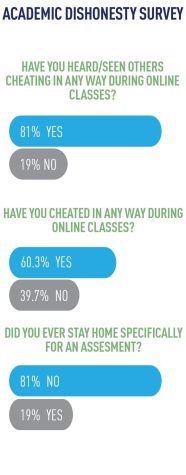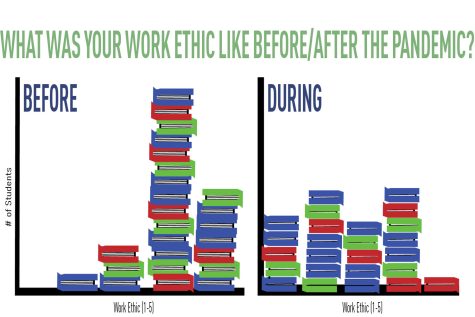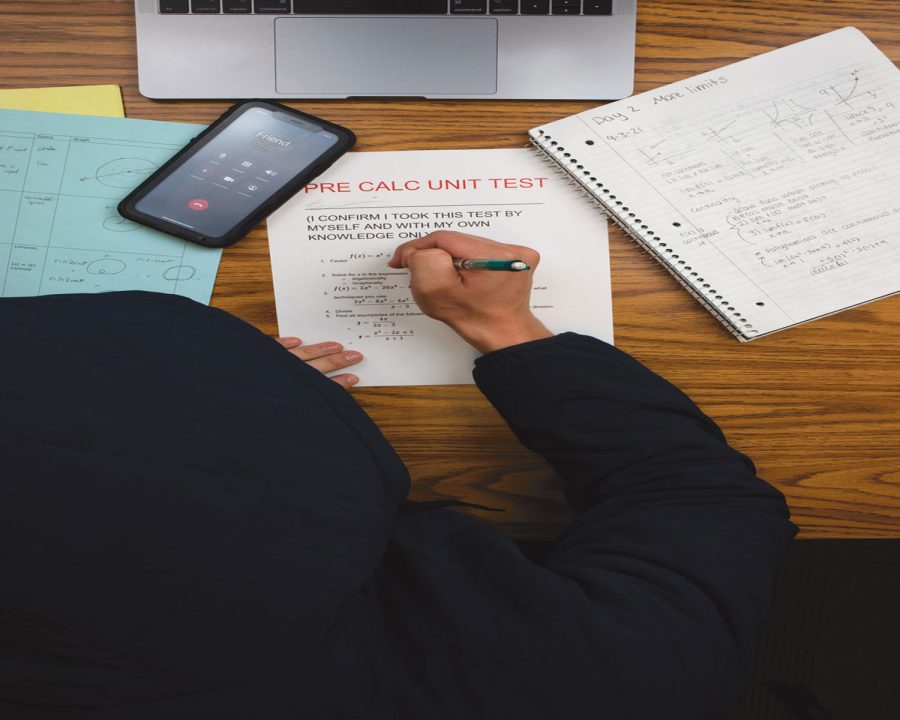Students Reflect On The Rise of Cheating During Covid-19
Consequence of Academic Dishonesty Arise
Photo: Matthew Sage
When school went online, students who had not previously cheated were forced into weighing the importance of academic honesty and integrity.
“I would use my notes because I wasn’t really learning anything and my grade was more important than my actual understanding of the topic,” one student from an anonymous interview said.
At the beginning of the coronavirus pandemic, University Prep’s classes and assessments transitioned to an online format. With students taking assessments off of Zoom, teachers relied on academic integrity. This made using class notes and texting or FaceTiming for answers more enticing than ever for students who may have never considered cheating, according to an anonymous survey sent to students by the Puma Press.
Head of Upper School Joel Sohn echoed the challenges students faced with academic integrity.
“It’s hard to not be tempted when you’re fully on your own on your own laptop and working at home,” says Sohn. “It was really about the individual kind of relationship and individual honor that one had to do their assessment in an ethical manner.”
With school slowly returning to normal, students who cheated online are now struggling to readapt. Reporting was done by a series of student, teacher, and administrative interviews, along with an anonymous survey of 63 students. All students quoted in the following article chose to remain anonymous for fear of academic discipline by administrators.

Lengths to Cheat
As the pandemic swelled and students’ motivation dipped, cheating became an increasingly popular trend with students finding new creative methods by the day.
Beyond Googling answers, students used their family members as resources instead of learning the material or seeking help from a teacher.
“Sometimes when I didn’t understand a question I would send it to my brother or ask my parents what the answer was,” an anonymous student told the Puma Press in an interview.
With Zoom limiting student to teacher interaction, many teachers resulted in giving parents proctored take-home tests.
“However, right after I logged out of Zoom, I would print out my test and then Facetime my friend,” an anonymous student told the Puma Press in an interview. “We did every single test, CA, quiz, and homework together, even ended up with the same grade. When it came to questions we didn’t know we would call a friend that already took the test or the class to help us.”
Math was not the only class students cheated in. Unable to proctor language classes students were able to easily cheat on assessments.
“I used translators during tests, for assignments, I even used it during class conversations,” an anonymous student told the Puma Press in an interview. “Google translate even has this cool feature where you can take a picture and it will translate it for you.”
Eventually, students stopped relying on studying and instead focused on looking up answers to questions on assessments.
“Every time I hadn’t studied for a test or was stuck on a question, I would just make a new tab on my computer, or pull out my phone,” an anonymous student said.
With no one looking over their shoulder, students found a variety of ways to cheat during assessments. Many students turned to companies that solve problems and sell test answers like Mathway, Chegg, Photomath, and Course Hero. Students are paid up to $15 a month to get step-by-step solutions to any problem.
“I never planned on cheating, but then on one test I was struggling so much on a problem, I just searched up the answer,” an anonymous student said. “After that it just got worse and worse, buying a Mathway subscription for $9.99 a month I was able to see the solution and steps to any problem.”
Combatting cheating
Realizing that academic dishonesty was becoming a serious occurrence, teachers quickly made prevention a top priority.
“Once 1/3 of the semester had gone by, we decided that the only way we can fight this is to give multiple versions,” Physics and Calculus teacher Dr. Ragini Narasimhan said. “So, we were making three, four versions of the same test.”
Combating cheating was not easy. Narasimhan said that the hardest work was grading and keeping the difficulty the same across the multiple test versions. Also, before assessments, she had students place their phones several feet away from their desks as she watched on zoom.
“It doesn’t mean you don’t have a second screen though, and you could be cheating away if you want to,” Narasimhan said. “So I don’t think [teachers] actually felt like we could prevent all cheating.”
Kira Rivera, who was hired during the pandemic, opted to make some of her classes completely open-note. She realized that students would use their notes regardless of guidelines.
“I think school and math specifically can be so overwhelming, that sometimes [teachers] need to give students a little bit of a break so that they can actually learn,” Rivera said. “If you’re stressed out all the time, I don’t think that’s the best learning environment.”
Rivera also noticed a trend around students’ attendance on assessment dates once hybrid learning resumed.
“I definitely noticed that there were students who liked to stay at home on test days,” she said. “But at the end of the day, if there’s not sufficient evidence, then you’ve got a weak argument for suspicion of cheating.”

Examining the Ethics
Cheating comes at a cost. Many students acknowledge that they knew they should not have cheated and are afraid of the potential consequences now that school is fully in person. One anonymous student that cheated throughout their language and math class is now concerned about their decision.
“Because of this, I don’t think I learned anything last year, and this year I’m scared that it’s coming back to hurt me,” an anonymous student told the Puma Press in an interview.
Another student went as far as creating a system to ensure that they would continue to learn while cheating.
“I had a rule, though. If I could prove that I would never use this specific subject or topic in my real life if I knew for a fact it wouldn’t be useful, it was okay,” an anonymous student said in a google form. “If not, I will try my best, and keep any cheating to a minimum but my integrity never stopped me from looking up what convex meant.”
Some students have already begun to see the effects that cheating has brought on themselves and others.
“I’m glad I continued to pay attention to class during the pandemic,” an anonymous student told the Puma Press in an interview. “Now my friends that had cheated throughout class are struggling and are having to relearn skills from last year.”
Words of wisdom
“The student is not necessarily cheating the system, the student is cheating themselves,” French teacher and Language Department head Isabelle Rio said. “We prefer you come to us [your teachers] and say, ‘I don’t know this material, please help,’ rather than use outside resources. We’ll help you.”
Rivera also believes that the only person affected by cheating is the student themselves.
“At the end of the day, academic honesty is always about integrity,” Rivera said. “So if you’re trying to be a person who has integrity, then you’re actually going to learn, and if you’re a person that’s trying to take those shortcuts, it’s just going to get harder and harder for you.”
Rivera also worries about the habits of students who continue to cheat even after the pandemic and prepare for college.

“College has very serious consequences for academic honesty. If you weren’t caught now, maybe it’s a good time to stop, and start being honest about your work so that you can be proud of the work that you can produce, even if it’s not perfect,” Rivera said.
A recent University Prep alumni, who recognizes both the disciplinary risks and moral consequences that come with cheating, shares advice for any students continuing to cheat.
“With the pressure of grades weighing down on each student, I understand why someone may cheat,” said the former student. “However, as someone who has cheated throughout the pandemic, I can tell you the only person you are cheating is yourself. If you do not understand the material, instead of googling it, go ask your teachers, otherwise, you are not learning and it will come back to hurt you.”

Ethan Matsubayashi is one of the print editors-in-chief of the Puma Press. He has been on staff for three years and is excited to explore innovative formats...




